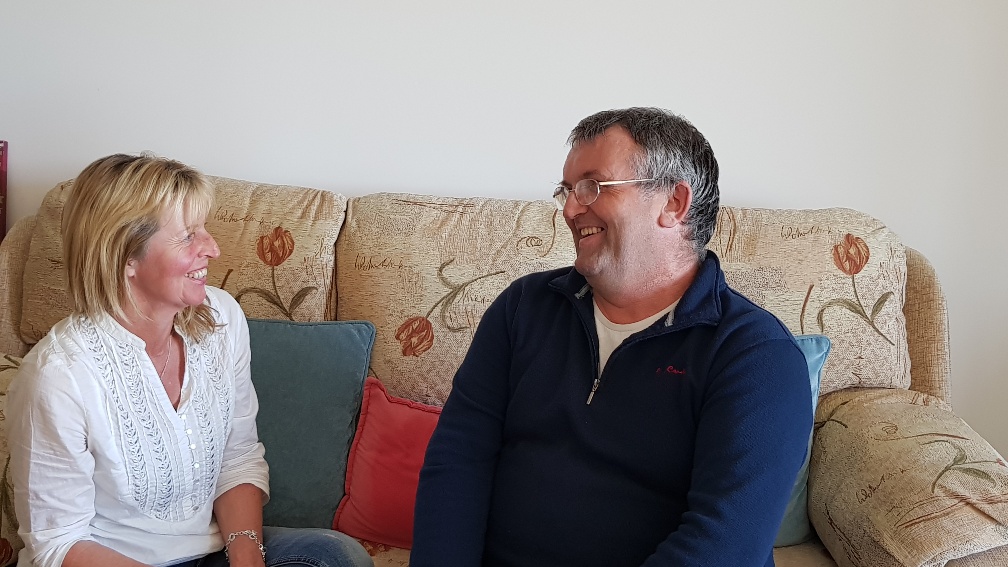Torbay and South Devon NHS Foundation Trust together with local authority partners, Torbay Community Development Trust’s (TCDT) National Lottery funded Ageing Well Programme, and local voluntary sector organisations, have secured £1.3m to fund the continuation of the Wellbeing Programme for the next four years. The Programme began in July 2016. The initial evaluation findings suggest that this Programme is enabling some participants to sustainably avoid hospital and acute care.
Since it began in July 2016, over 3,000 people in Torbay and South Devon have been referred to the Wellbeing Programme, to help them combat isolation and loneliness and experience enhanced feelings of wellbeing. This in turn is contributing to many cases of improved health outcomes, and the Trust and its partners believe it is enabling people to stay out of hospital and acute care.
The Wellbeing Programme is provided by seven voluntary sector organisations which together employ Wellbeing Co-ordinators, who are members of integrated Health and Wellbeing Teams. There are currently 12 whole time equivalent across the area, with some working part-time. The £1.3m funding secures their continued employment and training.
Wellbeing Co-ordinators have been welcomed into Health and Wellbeing Teams. Nurses, doctors and therapists are not always equipped to provide the kind of help and support that many people need, even though they may well need care and treatment from medical and other health and care professionals. Often, people need someone to talk to, to explore what might improve their daily life such as joining some kind of club or other social gathering. Getting out and about can be very daunting to someone who is feeling isolated, and having someone to lend encouragement and even accompany them to a meeting or an event for the first few times is what may break their pattern of isolation. The intervention of a Wellbeing Co-ordinator may also serve to prevent problems escalating, possibly preventing an eventual hospital admission. Dr Andrew Thornton, GP Partner at Pembroke House Surgery and Locality Clinical Director for Paignton and Brixham:
“In my GP practice in Paignton we have Wellbeing Co-ordinators attending our meetings, working to really embed and integrate them into our team. By working in this way, my GP colleagues are getting to know the Wellbeing Co-ordinators and see first-hand what a positive impact their interventions are having for many of our patients….Whenever I see an older patient and I think they might benefit from the support of a Wellbeing Co-ordinator, perhaps to help them get out and about in their local community, meet people and make new friends, then – with their consent – I will refer them to a Wellbeing Co-ordinator.”
The Wellbeing Programme was designed in recognition of the higher than the national average number of people aged over 75 living in the Torbay and South Devon area, whilst also acknowledging that many chronic health conditions affect people from around the age of 50. The programme is therefore targeted at people who are aged 50 and above, living with one or more chronic illness and who may be feeling lonely and socially isolated. People may be referred to the service by GPs, other health and care providers, and they may also self-refer.
The Wellbeing Programme was piloted as a social prescribing option for Torbay and South Devon, which has received increased interest from the NHS in recent years.
The evaluation comprised a sample of 182 older people across Torbay and South Devon with complex health and care needs who participated in the Wellbeing Programme between July 2016 and June 2017, looking at the impact on their health and wellbeing, and their experience of care and support and contact with health services in the system. The average age of the cohort was 77 years. The findings are that, on average:
Ø In South Devon, each person experienced a 21 per cent increase in their feelings of mental wellbeing, and an 8 per cent increase in their feelings of physical wellbeing;
Ø In Torbay each person experienced a 12 per cent increase in their feelings of mental wellbeing, and a 10 per cent increase in their feelings of physical wellbeing
Ø In South Devon, each person experienced a 45 per cent increase in their sense of social participation and connectedness, with reduced feelings of loneliness and isolation
Ø In Torbay, each person experienced a 58 per cent increase in their sense of social participation and connectedness, with reduced feelings of loneliness and isolation
Ø In South Devon, each person experienced a 24 per cent increase in their activation to manage their own wellbeing for themselves (this is called ‘patient activation’). We do not have an evaluation for this in Torbay.
To evaluate whether the Wellbeing Programme is helping to keep people out of hospital and acute care, we followed health contacts of 96 people from the above sample, looking at the number of A&E admissions, outpatient appointments and hospital stays after 12 months had elapsed since they began the Programme. We found that around 46 per cent of people sustained a decrease in A&E visits, outpatient appointments and hospital stays or had no additional contact over a year after the start of the programme.
This suggests that 54 per cent were still having the hospital contact, but in order to determine the extent of this, a control group is needed for comparison. In the future, the evaluation for the hospital/acute care contact will include a control group for comparison.
Within Torbay’s Ageing Well Project survey, a small sample of people working with Wellbeing Co-ordinators reported themselves as having 50 per cent less GP visits and 60 per cent less hospital admissions after being on the Wellbeing Programme for six months.
TSDFT and partners are concluding that the voluntary sector role in the Wellbeing Programme is a critical part in enabling people to stay out of hospital and acute care.
Liz Davenport, Interim Chief Executive, Torbay and South Devon NHS Foundation Trust says: “The Wellbeing Programme, which began as a ‘test and learn’ exercise, is proving to be of immense benefit to many of our local population. We knew we wanted to have wellbeing and prevention at the heart of our care provision, but we also know we have a lot to learn as to how we can make some inroads into actually providing this – the NHS is proficient at providing medical care when it is needed, but focusing on prevention is a relatively new area for us. This is where our strengthened integration with our local authority, GP and voluntary sector partners has really come into its own.
“It is very heartening to see the evidence that suggests that the Wellbeing Co-ordinators are making a positive difference to people’s lives and helping to reduce acute episodes of care. We are now stepping up our research so that we can better evaluate the impacts of the Wellbeing Programme on hospital and acute care, but these first results are very encouraging indeed.
“It is our intention to continue the Wellbeing Programme with our partners well into the future. Having funding confirmed up to 2021 will enable us to continue to develop and improve, hopefully helping to secure a sustainable future for the Wellbeing Programme.”
Torbay Council’s Executive Lead for Adults and Children, Councillor Julien Parrott, said: “I am really pleased that funding has been secured for this worthwhile programme. As a council we are responsible for adult social care and we are committed to working with our partners in an integrated way to improve the health and wellbeing of older people. Not only has this programme helped people feel less isolated, it has also reduced the number of visits to hospital and acute care, which can only be a good thing for everyone.”
Simon Sherbersky, Director, Ageing Well Torbay, Torbay Community Development Trust adds: “The Wellbeing Co-ordination service operating across Torbay and South Devon, delivered by Age UK Torbay and Brixham Does Care in Torbay, is a key part of supporting wellbeing, recognising the needs and aspirations of people over 50 as part of the approach, which has been proven to work and we are pleased to be supporting this over the next three years.”
Sue Wroe is Chief Officer, Teignbridge Community and Voluntary Services, supporting the delivery of the wellbeing programme in South Devon: “We have been working for some years to develop a vibrant voluntary sector and as a Wellbeing Partnership in South Devon we are pleased to collaborate with the statutory sector in this very successful programme, working towards our joint goals to enhance the lives of people in South Devon.”
Devon County Council’s Cabinet Member with responsibility for Adult Social Care and Health services, Cllr Andrew Leadbetter, said: “I’m delighted that we have been able to secure funding to continue the Wellbeing Coordinator roles. Wellbeing Coordinators are making immediate improvements on people’s quality of life, giving people the help they need to expand their opportunities to lead as full and active lives as possible. It’s help like this that can make real and meaningful difference to people, and ultimately prevent or reduce their reliance on hospital or other statutory care services.”
Shaun’s story: Shaun, a 52 year old man with degenerative spinal disease referred to this service from his GP in Paignton. He lived in a care home for respite following a brain injury, caused by a fall. During this time, his personal life started to fall apart, his partner would not allow him to return to their home, he did not have access to his finances and was left with nothing but the clothes he was wearing. Because of the circumstances Shaun also had input from other agencies, including a Social Worker.
Shaun was previously a very social man, his physical health had begun to improve but as he was in his 50’s the care home was far from the ideal place for him to be.
When a Wellbeing Co-ordinator first met him he struggled to speak about his situation. His Wellbeing Co-ordinator supported him to have his benefits returned to his control, to be back in touch with the outside world and go out. Shaun’s Wellbeing Coordinator took him to a monthly lunch group and a few coffee groups and he made friends instantly. Shaun was also getting help with his housing and just before Christmas was able to move into a flat in a managed building.
From a professional point of view we can evidence that Shaun’s wellbeing is vastly improved, his GP visits have reduced and he no longer needs residential care. From a community perspective, Shaun has been encouraging his neighbours to improve their wellbeing by setting up a coffee morning providing support to vulnerable people. He is now providing support and a smile to others. Shaun is also training to become a peer mentor for others with another local charity, Daybreak, after attending a mental health recovery course. Shaun says “Wellbeing Torbay supported me with my financial situation and then introduced me to people locally and it has saved my life. I can now look forward and help others, I can’t thank them enough.’

Helen Harman, Chief Officer, Age UK Torbay says: “Shaun’s story is both heart-wrenching and a great example of how the voluntary and statutory sectors can work together to improve the lives of older people. Age UK Torbay is proud to be part of Ageing Well, working to reduce social isolation in our 50+ generation, through our Wellbeing Torbay service. Our challenge continues, both finding isolated people and motivating them to engage with their local communities. Very simply, it’s about encouraging friendships, building networks of support and enabling people to make the most of their lives.”

You can join us on our social media pages, follow us on Facebook or Twitter and keep up to date with whats going on in South Devon.
Got a news story, blog or press release that you’d like to share or want to advertise with us? Contact us



























